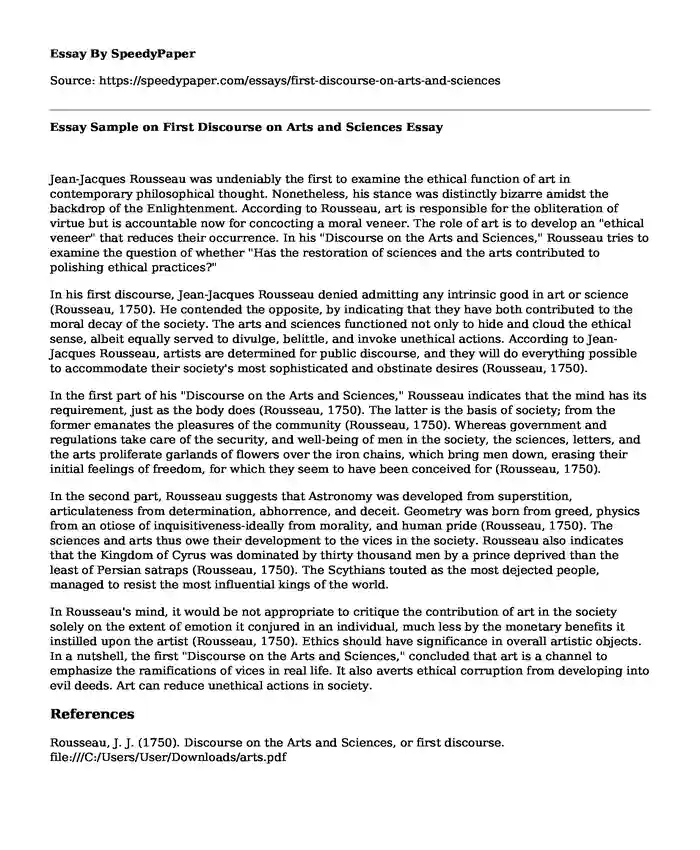
| Type of paper: | Essay |
| Categories: | Science Art Philosophers |
| Pages: | 2 |
| Wordcount: | 475 words |
Jean-Jacques Rousseau was undeniably the first to examine the ethical function of art in contemporary philosophical thought. Nonetheless, his stance was distinctly bizarre amidst the backdrop of the Enlightenment. According to Rousseau, art is responsible for the obliteration of virtue but is accountable now for concocting a moral veneer. The role of art is to develop an "ethical veneer" that reduces their occurrence. In his "Discourse on the Arts and Sciences," Rousseau tries to examine the question of whether "Has the restoration of sciences and the arts contributed to polishing ethical practices?"
In his first discourse, Jean-Jacques Rousseau denied admitting any intrinsic good in art or science (Rousseau, 1750). He contended the opposite, by indicating that they have both contributed to the moral decay of the society. The arts and sciences functioned not only to hide and cloud the ethical sense, albeit equally served to divulge, belittle, and invoke unethical actions. According to Jean-Jacques Rousseau, artists are determined for public discourse, and they will do everything possible to accommodate their society's most sophisticated and obstinate desires (Rousseau, 1750).
In the first part of his "Discourse on the Arts and Sciences," Rousseau indicates that the mind has its requirement, just as the body does (Rousseau, 1750). The latter is the basis of society; from the former emanates the pleasures of the community (Rousseau, 1750). Whereas government and regulations take care of the security, and well-being of men in the society, the sciences, letters, and the arts proliferate garlands of flowers over the iron chains, which bring men down, erasing their initial feelings of freedom, for which they seem to have been conceived for (Rousseau, 1750).
In the second part, Rousseau suggests that Astronomy was developed from superstition, articulateness from determination, abhorrence, and deceit. Geometry was born from greed, physics from an otiose of inquisitiveness-ideally from morality, and human pride (Rousseau, 1750). The sciences and arts thus owe their development to the vices in the society. Rousseau also indicates that the Kingdom of Cyrus was dominated by thirty thousand men by a prince deprived than the least of Persian satraps (Rousseau, 1750). The Scythians touted as the most dejected people, managed to resist the most influential kings of the world.
In Rousseau's mind, it would be not appropriate to critique the contribution of art in the society solely on the extent of emotion it conjured in an individual, much less by the monetary benefits it instilled upon the artist (Rousseau, 1750). Ethics should have significance in overall artistic objects. In a nutshell, the first "Discourse on the Arts and Sciences," concluded that art is a channel to emphasize the ramifications of vices in real life. It also averts ethical corruption from developing into evil deeds. Art can reduce unethical actions in society.
References
Rousseau, J. J. (1750). Discourse on the Arts and Sciences, or first discourse. file:///C:/Users/User/Downloads/arts.pdf
Cite this page
Essay Sample on First Discourse on Arts and Sciences. (2023, Oct 03). Retrieved from https://speedypaper.com/essays/first-discourse-on-arts-and-sciences
Request Removal
If you are the original author of this essay and no longer wish to have it published on the SpeedyPaper website, please click below to request its removal:
- Donald Trump Essay Sample from Our Free Database
- Statistics Essay Example
- Free Essay on Creativity as a Necessity
- Paraphrasing of the Poem, Literary Essay Sample
- Essay Sample on America's Fake News on Political or Social Issue
- Creative Works of Christi Belcourt. Essay Sample
- Decoding European Politics: Leaders, Laws, and the Road to Somewhere - Essay Sample
Popular categories




